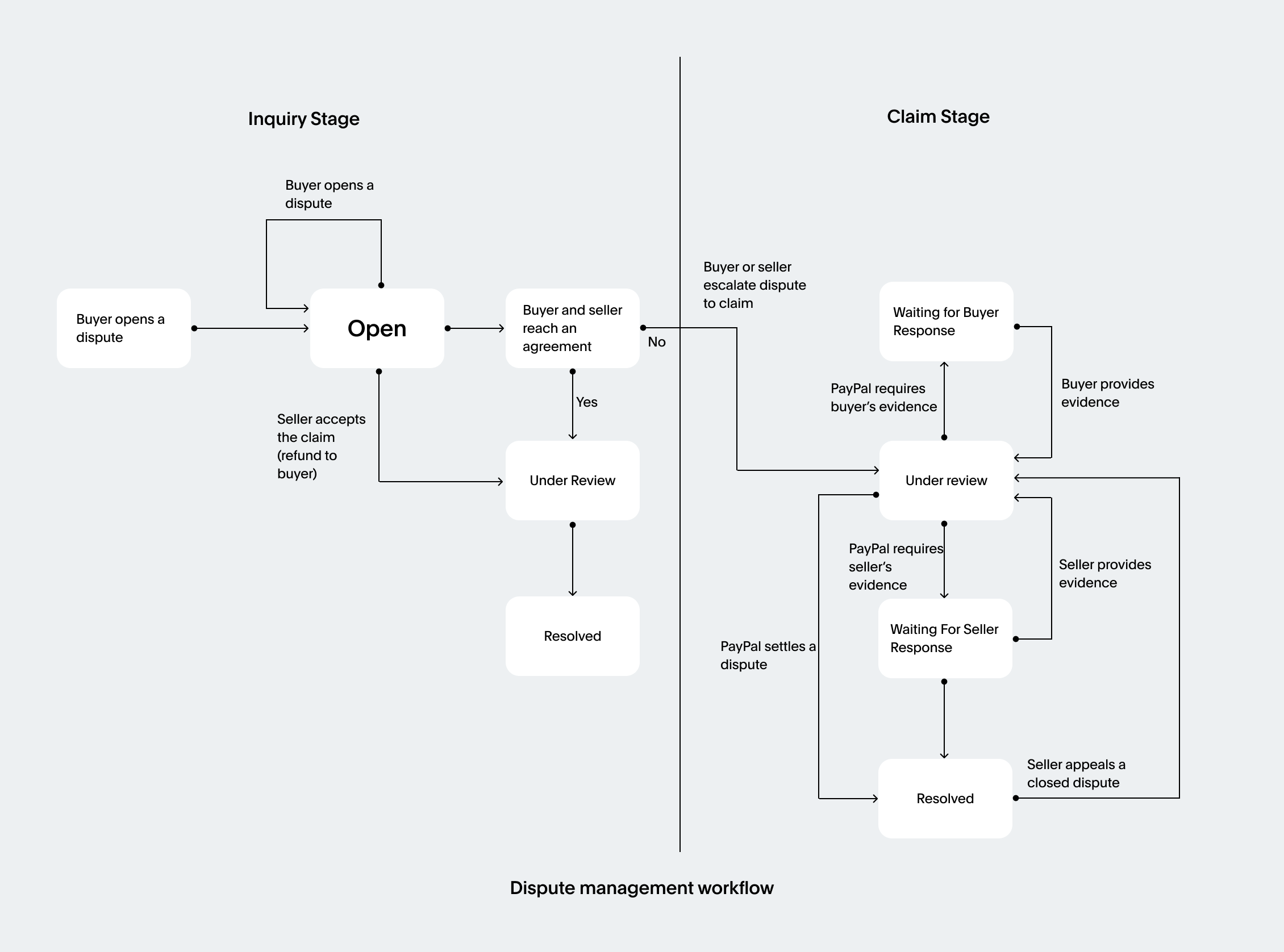Reference
Last updated: Jul 31st, 7:58pm
To understand the dispute management flow, learn about the dispute lifecycle stages:
Inquiry stage
The inquiry stage helps the buyer and merchant resolve the dispute independently without involving PayPal. During this phase, merchants can make offers to the buyer to reach an amicable resolution and avoid escalation. When the two parties cannot resolve the issue and the case escalates to PayPal, it moves to the claim stage.
The customer and merchant have a maximum of 20 days to resolve the dispute amicably without escalating to PayPal. Note that the inquiry stage is only applicable for `MERCHANDISE_OR_SERVICE_NOT_RECEIVED` and `MERCHANDISE_OR_SERVICE_NOT_AS_DESCRIBED` internal PayPal dispute cases.
This stage is not applicable for external dispute cases that buyers file through their financial institution, such as their card issuer or bank. The dispute_lifecycle_stage is INQUIRY during the inquiry stage.
Claim stage
If the buyer and merchant cannot resolve the dispute within the 20-day inquiry period, the buyer or merchant can escalate the dispute to PayPal. The dispute then enters the claim stage. Additionally, all non-merchandise-related and external disputes are created directly in the claim stage. The dispute_lifecycle_stage during the claim stage can be one of these values:
CHARGEBACK. A buyer or merchant escalates an inquiry to a claim, which authorizes PayPal to investigate the case and decide.
When the dispute enters this phase, all the buyer's notes are visible only to PayPal agents. The buyer must wait for PayPal's response before they can take further action. PayPal shares dispute details with the merchant, who can accept the buyer's claim, submit evidence to challenge the buyer's claim, or offer to resolve the dispute.
Note: The chargeback stage is a PayPal dispute lifecycle stage, not a credit or debit card chargeback.
PRE_ARBITRATION. The first appeal stage for merchants. A merchant can appeal a chargeback if the outcome is not in the merchant's favor. If the merchant does not appeal within the appeal period, the case is considered resolved.
ARBITRATIONis the second appeal stage for merchants. If the first appeal is denied, a merchant can appeal a dispute for a second time. If the merchant does not appeal within the appeal period, the case returns to a resolved status in the pre-arbitration stage.
Dispute resolution
To resolve the claim, PayPal considers the submitted evidence and settles the dispute in either the customer's or merchant's favor and communicates the outcome of the dispute to the merchant and customer.
Note: PayPal adjudicates only internal dispute cases. For external cases, the respective financial institution handles the dispute adjudication.
Disputes are settled during one of following dispute lifecycle stages:
INQUIRYCHARGEBACKPRE_ARBITRATIONARBITRATION
After resolution, the case is marked as RESOLVED.
Dispute statuses
The following list outlines the different dispute statuses a case can be in during its lifecycle and the actions that the respective parties can perform:
OPEN. The dispute is open.
The buyer actions available are:
validate-eligibilitysend-messageescalatecancelchange reason
After the merchant has provided an offer, the buyer actions available are:
accept-offerdeny-offer
The merchant actions are:
send-messagemake-offeraccept-claimescalatepartial-update
UNDER_REVIEW. PayPal is reviewing the dispute. In this case, the buyer and the merchant do not have any actions available. However, they can still provide additional information using the provide supporting info API that they feel might help PayPal better adjudicate the case.
RESOLVED. The dispute is resolved. In this case, the buyer and merchant do not have any actions available.
WAITING_FOR_BUYER_RESPONSE. The dispute is waiting for a response from the buyer. The available buyer actions are:
provide-evidencecancelchange reason
WAITING_FOR_SELLER_RESPONSE. The dispute is waiting for a response from the merchant. The available merchant actions are:
provide-evidenceaccept-claimmake-offerappeal- available for certain dispute cases after they have been resolved in the buyer's favor.acknowledge-return-item
Note: Refer to the HATEOS links provided in the dispute details API response to determine which actions are applicable at any given moment for a dispute case.
Dispute management flow
Internal cases: A dispute can be resolved in the inquiry or claim stages. The following figure represents the flow of an internal case.

External cases: External cases are created directly in the claim stage. Merchants can accept liability for the case by accepting the claim or providing relevant evidence to contest it. In the case of contestation, PayPal uses the evidence provided by the merchant to contest the case with the respective financial institution.
Available actions by stage
The actions available to the merchant and buyer vary during the stages of a dispute.
The following table shows the actions available to the buyer and seller during the stages of a dispute. Refer to the HATEOAS links to determine the actions available for the dispute.
Important: These actions are available only in the sandbox: settle dispute, create dispute, and update dispute status.
| Stage | Merchant actions | Buyer actions |
|---|---|---|
| Gathering information | ||
| Inquiry |
|
|
| Claim |
|
Disputes API
For a comprehensive list of all Disputes API end-points, see the API reference.